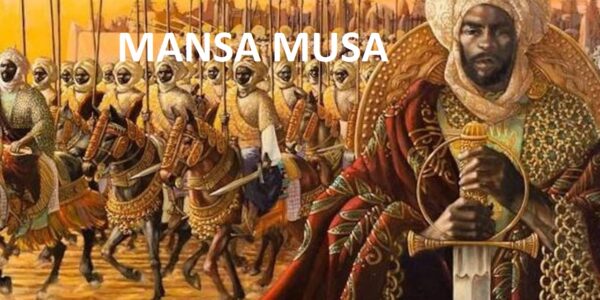IS Mansa Musa (Musa I of Mali)
Mansa Musa was a 14th-century ruler of the Mali Empire in West Africa, and he is widely considered one of the wealthiest individuals in history. He is particularly famous for his extravagant pilgrimage to Mecca in 1324-1325, during which he distributed so much gold in Egypt that he reportedly caused inflation. His empire was known for its vast wealth, largely derived from the region’s rich gold reserves.
Mansa Musa’s pilgrimage to Mecca was not only a religious journey but also a display of his wealth and power. He brought along a large entourage and caravan loaded with gold, lavish gifts, and retinues of soldiers and attendants. His generosity along the way, including the distribution of gold to the poor, further solidified his reputation.
The Mali Empire under Mansa Musa’s rule was a center of trade and scholarship, with Timbuktu becoming a renowned center of learning. Mansa Musa’s reign is often remembered as a golden age for the Mali Empire, characterized by prosperity, cultural advancement, and expansive trade networks.
Mūsā I of Mali
Mūsā I of Mali, commonly known as Mansa Musa, was the tenth Mansa, or ruler, of the Mali Empire, which was located in West Africa. He came to power in 1312 and ruled until he died in 1337. Mansa Musa is perhaps best known for his extravagant pilgrimage to Mecca in 1324-1325, which solidified his reputation as one of the wealthiest individuals in history.
During his pilgrimage, Mansa Musa brought with him a vast entourage and an immense amount of gold, which he distributed generously along the way. His lavish spending reportedly caused inflation in the regions through which he traveled, particularly in Egypt, where he spent and gave away so much gold that it disrupted the local economy.
Mansa Musa’s pilgrimage not only demonstrated his immense wealth but also served to strengthen diplomatic ties with other Islamic states and to showcase the power and prestige of the Mali Empire. He was a devout Muslim and contributed significantly to the development of Islamic institutions and scholarship within his empire.
Under his rule, the Mali Empire flourished economically and culturally, with Timbuktu becoming a center of trade, learning, and Islamic scholarship. Mansa Musa’s reign is remembered as a time of great prosperity and influence for the Mali Empire.
Pilgrimage to Mecca
Mansa Musa’s pilgrimage to Mecca in 1324-1325 was one of the most remarkable journeys of its time and has left a lasting legacy in history. Here are some key aspects of his pilgrimage:
Purpose: Mansa Musa’s pilgrimage had both religious and political motivations. As a devout Muslim, he felt compelled to fulfill the fifth pillar of Islam, the Hajj, which requires every able-bodied Muslim to make the pilgrimage to Mecca at least once in their lifetime. Additionally, Mansa Musa sought to demonstrate the wealth, power, and prestige of the Mali Empire to the Islamic world.
Preparation: Mansa Musa spared no expense in preparing for his pilgrimage. He assembled a vast caravan that included thousands of soldiers, officials, servants, and slaves. The caravan also carried enormous quantities of gold, luxury goods, and supplies for the journey.
Wealth Display: Mansa Musa’s pilgrimage was an opportunity to showcase the wealth of the Mali Empire. Along the way, he distributed gold generously to the poor and to those he encountered, often in extravagant displays of largesse. His extravagant spending, particularly in Egypt, reportedly caused temporary economic disruption and inflation in the regions through which he traveled.
Impact: Mansa Musa’s pilgrimage left a lasting impression on the Islamic world and beyond. It increased the Mali Empire’s visibility and influence in the international arena, fostering diplomatic ties with other Islamic states. Mansa Musa’s reputation as one of the wealthiest individuals in history was cemented by his pilgrimage, and it contributed to the spread of tales and legends about his wealth and generosity.
Overall, Mansa Musa’s pilgrimage to Mecca was not only a religious obligation but also a carefully orchestrated display of power, wealth, and prestige that left an indelible mark on history.
Conquest of Songhai kingdom
The conquest of the Songhai Kingdom by the forces of the Mali Empire is a significant event in West African history, marking a pivotal moment in the region’s political landscape. The Mali Empire, under the leadership of its rulers, including Mansa Musa and later successors, expanded its influence over neighboring territories, including the Songhai Kingdom.
The Mali Empire had long been a dominant power in the region, with significant control over trade routes and resources. However, by the 15th century, the Songhai Kingdom, located to the east of Mali, had emerged as a formidable rival.
The conquest of the Songhai Kingdom by the Mali Empire occurred in stages, with military campaigns led by various rulers of Mali. One of the most notable figures associated with the conquest was Sunni Ali Ber, who became the first ruler of the Songhai Empire after its conquest by Mali.
Sunni Ali Ber, a military strategist and leader, expanded the Mali Empire’s territory eastward by conquering various Songhai territories. His conquests were characterized by military prowess, strategic alliances, and the incorporation of conquered territories into the Mali Empire’s administrative and economic structures.
The conquest of the Songhai Kingdom solidified the Mali Empire’s control over much of West Africa and extended its influence over key trade routes, including those along the Niger River. It also facilitated the spread of Islam in the region, as both the Mali and Songhai empires were Muslim-majority states.
While the conquest of the Songhai Kingdom strengthened the Mali Empire temporarily, it also set the stage for the eventual decline of both empires. Internal conflicts, external pressures, and the rise of new regional powers would eventually lead to the fragmentation and collapse of both Mali and Songhai, paving the way for new political entities to emerge in the region.
Legacy
Mansa Musa’s legacy is significant and multifaceted, impacting various aspects of West African history, culture, and global perceptions. Here are some key aspects of his legacy:
Wealth and Generosity: Mansa Musa is widely renowned as one of the wealthiest individuals in history. His extravagant pilgrimage to Mecca, during which he distributed vast amounts of gold, gems, and other treasures, solidified his reputation for wealth and generosity. His largesse left a lasting impression on the regions he visited, contributing to the spread of tales and legends about his wealth and benevolence.
Promotion of Islam: Mansa Musa was a devout Muslim and played a significant role in promoting Islam within the Mali Empire and beyond. His pilgrimage to Mecca served to strengthen ties with other Islamic states and showcase the power and influence of Islam in West Africa. Under his rule, Islamic institutions flourished, and Timbuktu became a renowned center of Islamic learning and scholarship.
Cultural Patronage: Mansa Musa’s reign was marked by significant cultural achievements and patronage. He supported the construction of mosques, madrasas, and other Islamic architectural marvels throughout the Mali Empire. Timbuktu, in particular, flourished as a center of trade, learning, and culture under his patronage.
Economic Influence: Mansa Musa’s wealth and the Mali Empire’s control over key trade routes contributed to the region’s economic prosperity. The empire’s control over gold and salt trade routes facilitated extensive commerce and exchange, leading to economic growth and development in West Africa.
Historical Memory: Mansa Musa’s legacy continues to be celebrated and remembered in West African history and culture. His pilgrimage to Mecca and his reputation as a wealthy and benevolent ruler are commemorated in oral traditions, literature, and art throughout the region.
Overall, Mansa Musa’s legacy extends far beyond his reign as the ruler of the Mali Empire. He remains an enduring symbol of wealth, generosity, and cultural achievement in West African history.
Mansa Musa live
Mansa Musa lived during the 14th century, specifically from around 1280 to 1337. He ruled as the tenth Mansa (Emperor) of the Mali Empire, which was located in present-day Mali and parts of neighboring countries in West Africa. Mansa Musa came to power in 1312 and ruled until he died in 1337.
During his reign, Mansa Musa expanded the Mali Empire’s territory, wealth, and influence, making it one of the largest and wealthiest empires in the world at that time. He is particularly famous for his pilgrimage to Mecca in 1324-1325, during which he displayed his immense wealth and generosity, leaving a lasting impression on the regions he visited and solidifying his reputation as one of the wealthiest individuals in history.
Mansa Musa’s rule was marked by economic prosperity, cultural advancement, and the promotion of Islam. He supported the construction of mosques, madrasas, and other Islamic institutions, and he fostered trade and scholarship, particularly in the city of Timbuktu, which became a renowned center of learning and commerce under his patronage.
Overall, Mansa Musa’s life and reign are significant in West African history, representing a golden age of prosperity, culture, and Islamic influence in the region.
Mansa Musa country name
Mansa Musa was associated with the Mali Empire, which was located in West Africa. Today, the modern-day country that roughly corresponds to the territory of the historical Mali Empire is the Republic of Mali. Therefore, if we were to associate Mansa Musa with a modern country name, it would be Mali. However, it’s important to note that during Mansa Musa’s time, the political and geographical landscape was quite different from what it is today, and the concept of modern nation-states did not exist in the same way.
Conclusion
Mansa Musa, the 14th-century ruler of the Mali Empire, is a figure of historical significance due to his immense wealth, lavish pilgrimage to Mecca, and patronage of education and the arts. His reign marked a golden age for Mali, characterized by economic prosperity, cultural flourishing, and increased influence in the Islamic world.
Mansa Musa’s legendary Hajj pilgrimage in 1324, during which he distributed vast amounts of gold and made extravagant displays of wealth, brought Mali to the attention of the wider world and cemented its reputation as one of the wealthiest empires of its time. However, this act also led to economic consequences, such as inflation, in the regions he visited.
His patronage of education and Islamic scholarship contributed to the intellectual and cultural advancement of Mali, fostering an environment conducive to learning and artistic expression. This legacy is evidenced by the construction of mosques, madrasas, and libraries throughout the empire.
Despite his achievements, Mansa Musa’s reign also faced challenges, including succession disputes and the eventual decline of the Mali Empire following his death. However, his impact on West African history and his legacy as a powerful and wealthy ruler continue to be remembered and celebrated to this day.
FAQs
Certainly! Here are some frequently asked questions about Mansa Musa:
Who was Mansa Musa?
Mansa Musa was the ruler of the Mali Empire in the 14th century. He is renowned for his immense wealth, extravagant pilgrimage to Mecca, and patronage of education and the arts.
How did Mansa Musa become so wealthy?
Mansa Musa’s wealth stemmed primarily from the abundant resources of the Mali Empire, particularly gold and salt. Mali was one of the largest producers of gold in the world at the time, and Mansa Musa’s control over the empire’s resources contributed to his immense wealth.
What was Mansa Musa’s famous pilgrimage to Mecca?
In 1324, Mansa Musa embarked on a pilgrimage, or Hajj, to Mecca. During this journey, he famously distributed vast amounts of gold along the way, making extravagant displays of wealth that caught the attention of the Islamic world and beyond.
How did Mansa Musa’s pilgrimage impact the regions he visited?
Mansa Musa’s pilgrimage had significant economic consequences in the regions he visited, particularly in Egypt and the Middle East. His lavish spending led to temporary economic disruptions, such as inflation, as the influx of gold disrupted local economies.
What was Mansa Musa’s legacy?
Mansa Musa is remembered for his wealth, piety, and patronage of education and the arts. His reign marked a golden age for the Mali Empire, characterized by economic prosperity, cultural flourishing, and increased influence in the Islamic world.
What happened to the Mali Empire after Mansa Musa’s death?
After Mansa Musa’s death, the Mali Empire faced internal strife, succession disputes, and external pressures from neighboring states. Over time, the empire declined, eventually fragmenting into smaller states by the 17th century.
How is Mansa Musa remembered today?
Mansa Musa is celebrated as one of the most influential and wealthy rulers in African history. His legacy continues to be honored in West Africa and beyond, with monuments, festivals, and cultural events commemorating his achievements. Additionally, Mansa Musa remains a symbol of African wealth, power, and cultural heritage.


 For all latest news, follow The carefulu Google News channel.
For all latest news, follow The carefulu Google News channel.





